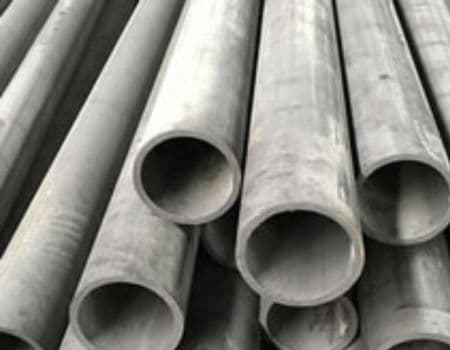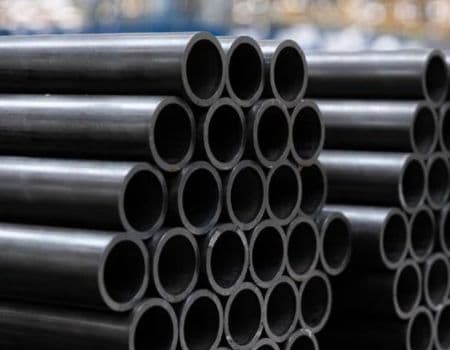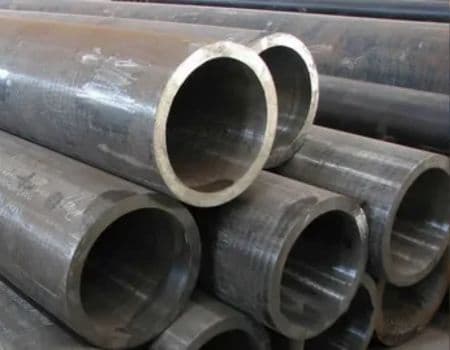| Specifications | Astm, Asme |
|---|---|
| Thickness | 4.0mm |
| Pipes Size | 1/8” Nb, 24” Nb |
| Tubes Size | 1/2″ Od |
| Length: | Single Random, Double Random, Required Length |
| End | Plain End, Threaded |
Alloy steel seamless pipes manufactured in India for power plants refineries petrochemical and high temperature piping systems
Sagar steel corporation is a trusted Alloy Steel seamless pipes manufacturer in India providing pipes that are designed to be strong, precise, and reliable in harsh industrial conditions. Alloy steel seamless pipes are manufactured without welded joints, thus offering a uniform wall thickness, increased load-bearing capacity and increased resistance to internal pressure thus can be used in critical process systems.
Seamless pipes made of alloy steel are widely applied in the tasks that are characterized by the high temperature, variability of pressure, and harsh operating conditions. The controlled alloy composition provides resistance to thermal fatigue, scaling and mechanical wear making performance remain stable in refineries, boilers, heat exchangers, power plants, and petrochemical units. Pipes are available in various sizes, schedules and surface finishes to aid in fabrication, bending and installation.
Alloy Steel Seamless Pipes – Material & Grade Table
| Material | Grade | Standard | Equivalent | Key Properties |
|---|---|---|---|---|
| Alloy Steel | ASTM A335 P11 | ASTM A335 | EN 10216-2 13CrMo4-5 | High-temperature strength |
| Alloy Steel | ASTM A335 P22 | ASTM A335 | EN 10216-2 10CrMo9-10 | Excellent creep resistance |
| Alloy Steel | ASTM A335 P5 | ASTM A335 | DIN 12CrMo19-5 | Corrosion & oxidation resistant |
| Alloy Steel | ASTM A335 P9 | ASTM A335 | EN 10216-2 15Mo3 | High pressure service |
| Alloy Steel | ASTM A213 T11 / T22 | ASTM A213 | ASME SA213 | Boiler & heat exchanger use |
Alloy Steel Seamless Pipes – Sizes, Types & Availability Table
| Pipe Type | Outside Diameter | Wall Thickness | Length | Minimum Quantity |
|---|---|---|---|---|
| Seamless Pipes | ½″ – 24″ | SCH 10 – XXS | 6 m / 12 m | 200 Pcs |
| Boiler Tubes | ½″ – 4″ | As Per Standard | 6 m | 200 Pcs |
| Heat Exchanger Tubes | ½″ – 3″ | As Required | Cut Length | 200 Pcs |
| Custom Seamless Pipes | As Required | As Required | As Required | 200 Pcs |
Key Features of Alloy Steel Seamless Pipes
Alloy steel seamless pipes are selected in cases that the projects require operational safety and longevity.
- Standardization as a result of continuous production.
- Very low permeability to pressure and temperature change.
- Better mechanical strength and hardness.
- High-quality corrosion and oxidation resistance.
- Dependable long-term service performance.
All these features ensure that they are applicable in critical industrial piping networks.
We are also supplying Stainless Steel 304S Seamless Pipes, Stainless Steel Seamless Pipes, and Duplex Seamless Pipe to meet the diverse project needs enabling our customers to settle on the appropriate grade of material according to the operating temperature and exposure to corrosion with one sourcing partner.
Type of Sub-products

Astm A335 P5 Alloy Steel Pipe Astm A335 P5 Alloy Steel Pipe
Seamless ferritic alloy steel pipe with chromium and molybdenum ensures high strength and heat resistance.

A335 P2 Alloy Steel Pipe A335 P2 Alloy Steel Pipe
A carbon steel pipe that contains chromium, molybdenum, and sometimes vanadium.
